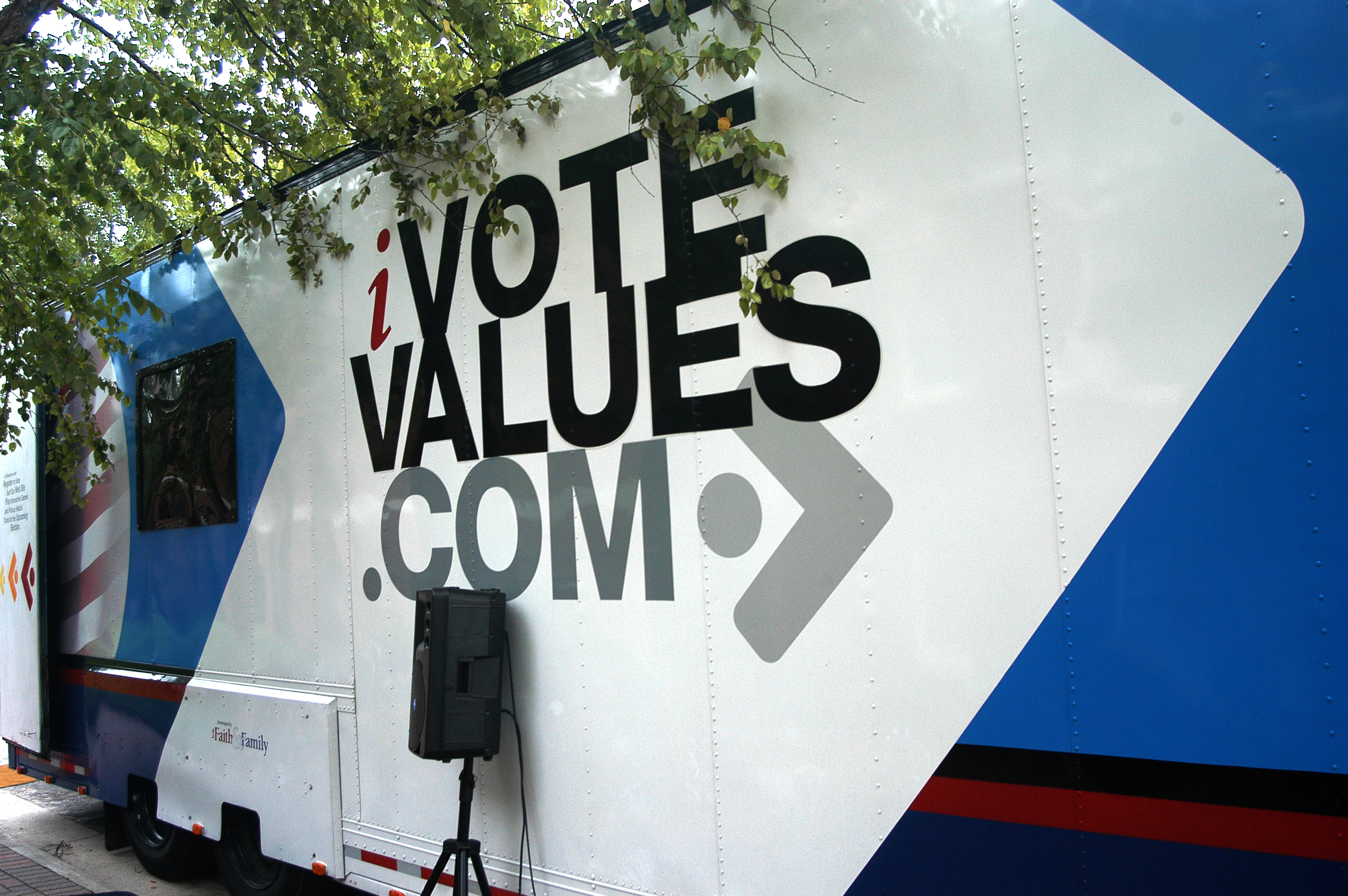
NASHVILLE, Tenn. (BP)–In 2000, an estimated 15 million evangelicals voted. This year, that number jumped to more than 27 million. It’s safe to say that the emphasis on moral issues — led in part by the iVoteValues initiative — worked.
More than 61,000 new voters were registered this year through the iVoteValues effort both online and through the iVoteValues 18-wheeler truck. In addition, it distributed 90,500 bulletin inserts as well as some 306,000 party platform comparison guides.
But more than that, the campaign helped focus the nation’s attention on moral issues instead of pocketbook issues. Developed by the Southern Baptist Ethics & Religious Liberty Commission, the iVoteValues initiative also was promoted by Focus on the Family and the Family Research Council. Two largely identical websites — iVoteValues.com and iVoteValues.org — provided information about various issues and also allowed people to register to vote. Each website received more than 200,000 visits for a total of approximately 400,000.
“There is no question that American voters were sensitized to the importance of voting their values,” said Richard Land, ERLC president.
In fact, iVoteValues officials believe their efforts easily could have resulted in hundreds of thousands of newly registered voters. Some 38,000 voter registration forms were downloaded, and those forms could have been copied and given to family members and friends. Also, Focus on the Family mailed out 1.3 million registration forms to its constituents in the final months of the election. The ERLC mailed out 15,000.
Moral issues played a significant role in the election outcome. Exit polls showed that “moral values” — undefined in the questionnaire — were the top issue for 22 percent of votes. Values ranked first, ahead of the economy/jobs (20 percent), terrorism (19 percent) and Iraq (15 percent).
Among those listing moral values as their top issue, 80 percent voted for Bush, 18 percent for Kerry.
In the days following the election, political strategists and media pundits have examined the issue of morality and values voters — both of which received scant attention prior to Election Day.
“While the national news media may have been surprised with that finding [moral values topping the list], I knew in my heart American families are troubled over the state of our culture,” Land told Baptist Press. “Efforts like the iVoteValues initiative were used by God to convict and remind Americans of faith that they had an obligation and the right to have their faith inform their voting decisions.
“It is not overstating the election results, both in the presidential and U.S. Senate contests, to say that traditional religious values won the day, and that much of the credit goes to voters who heard the message that voting your values, beliefs and convictions is best for America.”
Exit polls showed that nearly one-fourth of voters — 23 percent — called themselves evangelicals and/or born again Christians. Among those voters, 78 percent voted for Bush, 21 percent for Kerry.
In fact, exit polling showed a “religious gap” between Bush and Kerry, with churchgoers more likely to vote for the president and secular voters more likely to vote for Kerry.
According to the exit polling data, Bush led 64-35 percent among those who attend church more than one time a week, and 58-41 among those who attend church once a week. In both categories, Bush saw a 1 percent increase from 2000.
Among those who never attend church, Kerry led 62-36 percent.
The showing by Bush among churchgoers came as same-sex “marriage” — mostly a non-issue in 2000 — dominated the values debate. Thanks to a ruling by its high court in May, Massachusetts became the first state to legalize same-sex “marriage.” In a backlash, 11 states followed by placing state constitutional amendments banning “gay marriage” on their ballots. All of them passed with an average of 70.1 percent.
Bush supports a marriage amendment to the U.S. Constitution and frequently mentioned values issues during the campaign, particularly the marriage issue and his desire to build a “culture of life” in America.
The values debate extended to the U.S. Senate, where several pro-life and pro-marriage amendment candidates won. Among those was John Thune, who made his pro-life position and his support for a constitutional marriage amendment a central part of his campaign against Democratic Minority Leader Tom Daschle, who is pro-choice and opposed the marriage amendment. Thune won.
“I am deeply grateful to God,” Land said, “for the millions of Southern Baptists and other Americans of traditional religious faith who supported the iVoteValues campaign and who voted their values, beliefs and convictions and who encouraged others to vote their values, beliefs and convictions. A record number of Americans registered to vote and a record number of Americans went to the polls, some waiting in long lines, to vote.”
It is not the first time that moral values have topped the list of issues, though. In the 2000 campaign, a Los Angeles Times exit poll showed “moral/ethical values” topping the list, with 35 percent of voters saying it was most important. Among them, 55 percent voted for Bush, 32 percent for Ralph Nader and 17 percent for Gore. During 2000 Nader made criticism of the ethics of government and big corporations a central theme of his campaign.
When comparing the 2004 data to the 2000 data, Bush received a 25-point boost among values voters.
–30–
















